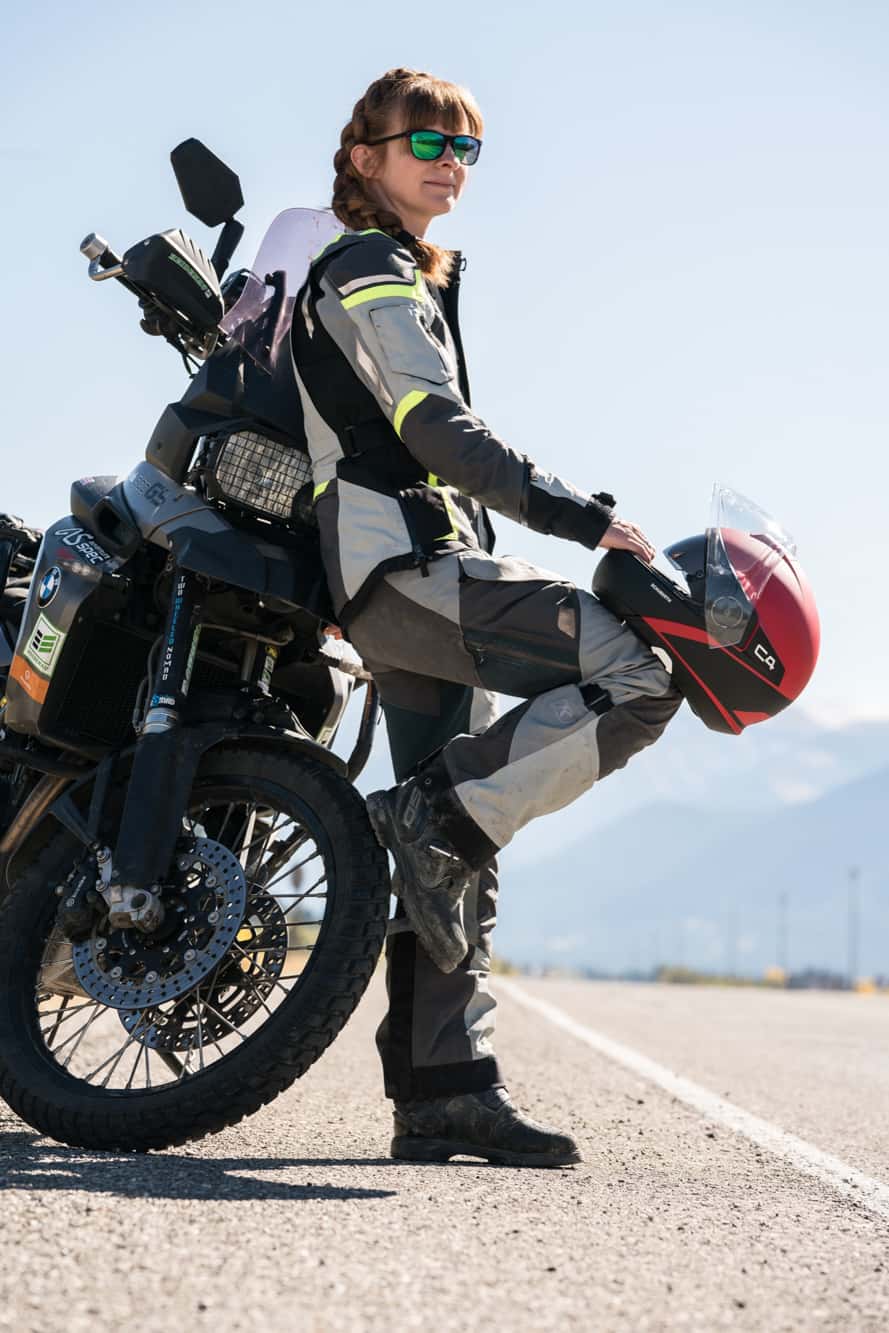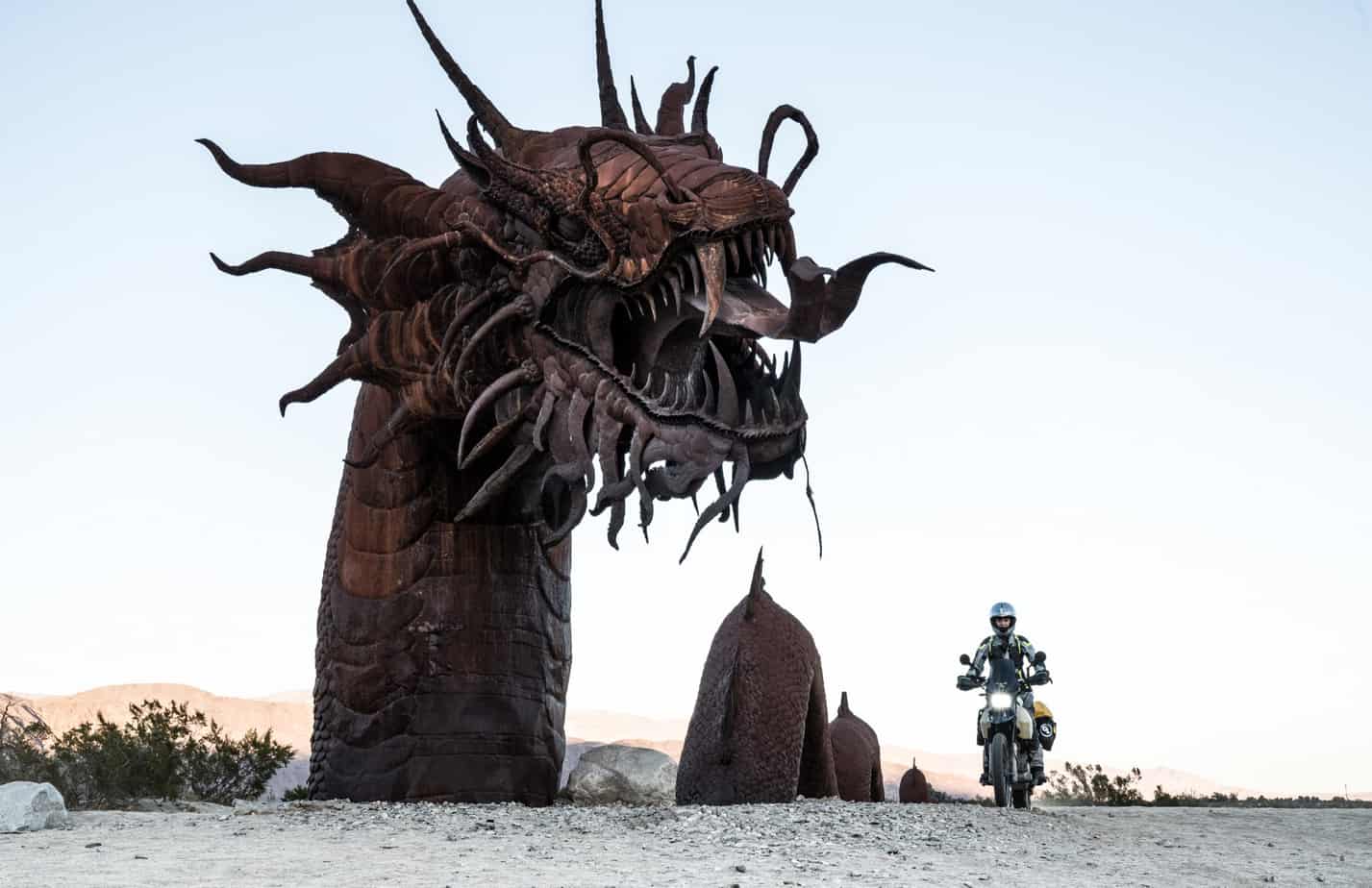With an improving industry standard in women’s motorcycle apparel, I was excited when the senior product developer at Klim asked me to scrutinize a two-piece set of their latest offering for women, made by women, the Artemis. As a full-time location independent rider, I require a suit that employs excellent protection and day-long comfort in the saddle on pavement as much as off-road—a weatherproofed ride come rain, hail, or shine, and something that is actually contoured to the female form. In the context where women’s specific motorcycle apparel is still limited in today’s market, I’m not demanding too much, am I?

Aesthetics
My first impressions upon delivery were very positive. The colours work beautifully together, adding femininity without it being bedazzled in sequins, swirly graphics, and sparkle. I couldn’t wait to ride in it.
Articulation On and Off the Machine
Ergonomically, the suit and the armour work with my body, joints, and limbs, offering good mobility. The fabric is flexible, and overall, I can’t criticize the fit regarding the articulation on and off the bike. Having spent all day riding and hours up on the foot pegs, the suit presented no manoeuvrability issues.



Comfort Levels
The comfort achieved in the suit is excellent—particularly with every vent wide open in hot weather. The articulated elbows and adjustments at the biceps, forearms, and waist, combined with Klim’s female-centric tailoring, make the Artemis a joy to wear for long miles on the road.
Venting
One of the aspects I instantly liked about the Artemis is the optimal placement of ventilation. I can vouch that it kept me sweet natured and cool in 75°F even in gridlock traffic, and foremost, it wasn’t intolerable in temperatures pushing 85°F and up. I can also attest that it keeps me bone dry when the weather takes a turn for the worse.

Because the jacket has 10 vents and two zippered pleats at the side of each hip, it allows for expansion. A favourable outcome supported by the waist’s adjustment sliders, too. The two most prominent outlets are the vent panels at the upper portion of the chest, complemented by two unique cross-core ones below to further enhance airflow. The two large vertical back vents in conjunction with the mindful array on the front invite more air than I anticipated, aided by two articulated openings on the forearms and another pair on the biceps.

The pant is equally well ventilated where the air is pushed through a pair of front thigh intake vents and out of two vertical back exhausts, creating a fantastic airflow from front to back. Because the lower leg can also be unzipped and widened, the lower leg can be reshaped into an aerated, bootleg offering when desired.

Fabric Performance
Very little flapping occurred thanks to the ample adjusters, and the suit doesn’t bunch or ride up. During colder mornings, it feels cool at first, but once it makes contact with body heat, the fabric loosens up. After a few thousand miles in the prototype, it is as comfortable now as it was upon wearing it for the first time.
There is some stretch built into the design, which makes slipping in and out of the suit easier, and allows you to sit down in the tent or stand up by the roadside without an ounce of struggle. I haven’t spotted any deterioration of fabric, snagging, or pilling. The jacket and pant never look over-stretched or baggy, although there is that expected room in the backside of the pant, which is required to maintain a pleasant riding position.

Water Resistance
Like many year-round riders, I’m well protected in the colder months thanks to the Gore-Tex shell that’s “Guaranteed to keep you dry.” A technical claim that has become the standard of weatherproof-bashing layers. Having spent too many days in driving rain through Washington and Oregon winters, the two-layer performance shell prevents the invitation of a single raindrop.

Storage
There are an optimal number of pockets: two zippered and Velcro hand pockets, two zippered chest pockets, a large one on the rear, a handy upper arm pocket, and internally, three stash compartments and a concealed document pocket behind the back. Conveniently, there are also two zippered cargo pockets on the pant.
Special Features
My two bugbears in former Klim pants have been resolved. Firstly, with the bottom hem adjustment on the Artemis—adjustable with three snaps and a zippered pleat—my legs remain insulated when it’s cold, wet, and windy. Conversely, they can be exposed to refreshing drafts in warm conditions. Secondly, the pant now possesses storage on each leg. When off the bike during the ride day, I adore ditching the jacket but still having my keys and wallet in one pant pocket, and GPS in the other. I can finally keep everything on my person, which is a fundamental complaint addressed for me. Glorious.

There are certain vents employed that warrant a special mention: the cross-core ones around the lower portion of the chest that were not featured on previous women’s offerings, or even the men’s jackets for that matter. In searing temperatures they permit your chest to stay aerated in a “comfort mapped ventilation” system, which is sublime. I also appreciate the microfleece collar in colder weather—no chafing and it feels cozy around my neck—improved with a polygiene anti-odour liner on top. The two elasticated hooks are also pure genius in warm weather, opening the collar allowing for increased airflow.
Additionally, unlike other suits in this category, the Artemis doesn’t include insulation or waterproof liners, to which I loudly applaud.

Developing Area
A minor upgrade for me would be to remove or reduce the storm flaps on the pant pockets altogether. No biggy, but it would diminish any widening effect of the hips.
Quality
The suit is comprised of easily identifiable layers. Gore-Tex breathable fabric constitutes the main body. Over the shoulders and outer arms is an abrasion resistant overlay of Karbonite ripstop in the high abrasion zones. The high impact areas at the back of the pants, knees, and lower leg at the back are made from more of the same. The inside leg offers a hard wearing but soft goat leather to prevent deterioration against the motorcycle long-term. It also adds tremendous grip on the gas tank when up on the pegs during more aggressive rides.

Colourway
The prototype tested isn’t one of the production colourways. The two combinations available are a mid-grey offering with red accents, and a dark grey and tan with high-vis detailing. Compared to other suits worn, the Artemis is incredibly stylish in its use of colour, and consequently more practical in the heat. The hi-vis on the jacket (available on the tan and dark grey version), gives me a greater road presence, and the darker panels are strategically allocated where I tend to make contact with the ground, especially kneeling down.

Forgive any grandiosity but I have never felt better catered to than in this suit, especially compared to those predominantly in black. For me, the negatives of black outweigh the positives: my road presence is diminished, and black is too similar to the men’s gear. I’m a woman rider and want other road users to recognize that. Foremost, black keeps absorbing heat where a three-season suit soon becomes unbearable to wear in hot climates. Although flattering for the fuller figure and far better at hiding the dirt, I’d sooner be cooler in a suit that doesn’t hide the dirt as well, than suffer my own personal summer inside a cleaner looking two-piece. Thanks to Klim’s product development team, the Artemis goes beyond making the woman rider look good—it makes her look great.
Closures
I relish the non-water resistant zippers as much as the water resistant ones, and the rain gutters that accommodate them. Furthermore, I can easily locate the chunky YKK zippers in winter-gloved hands, and none of them have seized or become stuck with sand and dirt. The current employment of Velcro on the jacket is good, although I prefer the use of zippers on the pockets, as Velcro can snag on other fabrics and hair, wear quicker, and weaken sooner. That said, the use of interior Velcro works well.

Protection
The protection of the Artemis is something to write home about. Easy to pop in and remove with accessible meshed Velcro or open pockets, all identifiable by hi-vis trims. The armoured pockets ensure secure placement of each piece, where the CE-certified integrated D30 level 1 and Viper 1 pads are flexible, soft, and have decent ventilation properties, adding minimal bulk.

Conclusion
For overall responsiveness, this is the best three-season suit I’ve worn to date. The protective components are better than average; they’re second to none. As Klim’s flagship suit made by women, for women, it comes with a selection of cutting-edge materials in a two-piece constructed for three-season capabilities. The result not only offers optimal protection, but terrific aeration to boot. It’s also supple, not heavy, so it doesn’t sap your energy level throughout the day.
Ultimately, it’s a high-end product for women that’s built to go the distance. The fact that it is a beautiful looking suit is just the cherry on top. I’d go as far as to say it’s striking even. True to size across many shapes and sizes, Klim has blown all previous offerings out of the ballpark with this back-in-the-net technical piece for female riders. Style meets performance, and for the category of riding, the Artemis is currently trailblazing the women’s arena.

PROs
- Unprecedented ventilation system tailored to the female form.
- A gender-specific adjustable fit that works well in practically all conditions.
- Improved storage on the pant and ample compartments throughout the jacket.
- No need for liners, the Gore-Tex suit is permanently waterproof.
- A very stylish offering.
CONs
- A fully featured flagship suit that’s designed to be bought only once does make this a large purchase.
Klim.com| Jacket, Size S-2X $700 | Pant, Regular Size 4-16, Tall 6-12 $550-$570
twowheelednomad.com and jasonspaffordphotography.com


